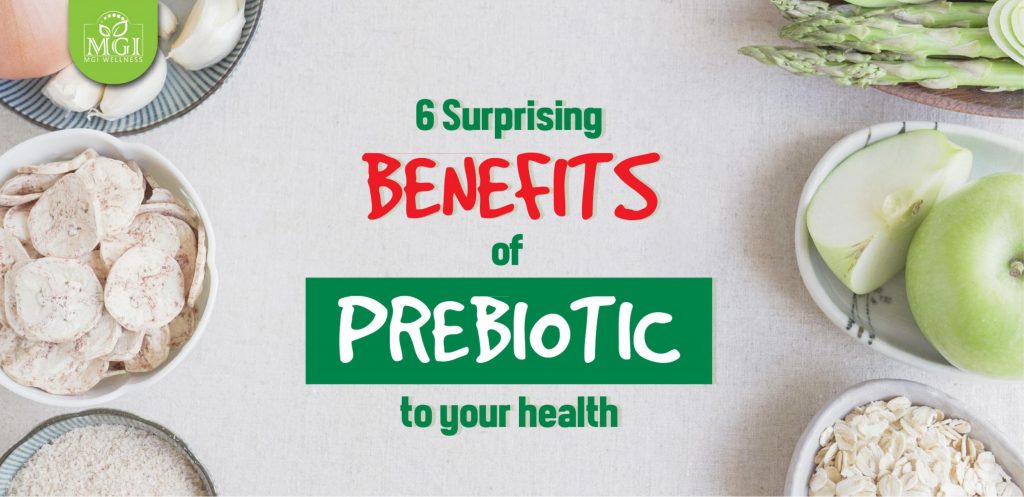Wellness
6 Surprising benefits of Prebiotic to your health
You are what you eat ! A healthy gut all starts with feeding it the right foods. You have properly often heard of probiotics (foods or supplements that contain live microorganisms to improve the “good” bacteria in the body.) and all the amazing benefits they have for your overall health. But did you know prebiotics are just as important?
What are prebiotics?
Prebiotics are specialized plant fibers. They feed your friendly gut bacteria and act like fertilizers that stimulate the growth of healthy bacteria in the gut to improve digestion and overall gut health.(1)
Prebiotics are found in many fruits and vegetables, especially those that contain complex carbohydrates, such as fiber and resistant starch. These carbs are not digestible by your body, so they pass through the digestive system to become food for the bacteria and other microbes. Some tasty and delicious prebiotic foods include bananas, apples, berries, asparagus, mushrooms, oats, legumes, onions, garlic and sweet potatoes.
Health benefits of prebiotics
Now that we know how great prebiotics are for the health of our gut bacteria, we can’t just stop here. Prebiotics are filled full of many other important health benefits. Let’s see the other surprising benefits of prebiotics that you have never ever think about it!
• Keep your gut healthy and happy Prebiotics can keep your gut healthy and improve overall digestion. These fibrous foods help
maintain a healthy gastrointestinal system by increasing the presence and diversity of good bacteria.They can increase the presence and diversity of “good” bacteria that help ward off pathogens in your intestinal tract and help to rude the risk of leaky gut syndrome, irritable bowel
syndromes , bloating, constipation and other intestinal issues.(2)
• Better nutrient absorption
Prebiotics help probiotics recolonize in the gut. When your body is able to properly absorb nutrients, it helps you convert food into energy more readily. For example, study showed prebiotics protecting your bones by boosting absorption of vital minerals such as calcium and magnesium which are needed for bone health.(3)
• Help to maintain a healthy weight
Eating tons of plant fibers (prebiotics) can help you stay fuller longer and reduce excess food craving and calorie intake. Thus, you can stay on track with your weight loss goals. Prebiotic fibers’ ability to absorb water helps “fill” the stomach more readily, which in turn blocks the
hunger hormone ghrelin for greater appetite control.[4] In other words, prebiotics are great for weight loss, prevention of obesity and maintain balanced energy levels.
• Increase immune function and lower inflammation in the body
Our gut wall houses about 70% of our immune system cells. Clinical study showed one of the beneficial effects of prebiotics is the stimulation of the immune system and keeps inflammation down.(5) When our gut is functioning at full power, it acts as a barrier to viruses, bacteria, and
pathogens. Prebiotics, together with probiotics helps to maintain healthy gut , which in turn reduce allergies and infections while boosting overall immunity. They also help our bodies absorb essential nutrients, which gives the body energy to keep immune function running
smoothly.
• Help to cope with stress
Regular amounts of prebiotics in your diet can help promote a better balance of gut bacteria and help the body recover following a stressful event. Study has shown that people who consume food rich in prebiotics are less susceptible to anxiety and stress.(6) This has been
attributed to the low levels of cortisol that is associated with the increase in fiber intake.
• Help to reduce risk of cardiovascular disease
People who eat a diet rich in prebiotics have a lower risk of cardiovascular disease. Prebiotics are known to have a hypocholesterolemic effect in which they are effective in improving lipid profiles, including the reduction of serum/plasma total cholesterol, LDL-cholesterol and
triglycerides or increment of HDL-cholesterol. Getting a daily recommended dose of prebiotics (4-6 grams) helps to reduce glycation, a known cause for increased free radicals in the body that cause cardiovascular disease.(7)
References:
(1)Dorna et al. Prebiotics: Definition, Types, Sources, Mechanisms, and Clinical Applications. Foods. 2019 Mar;8(3):92
(2)Annett Klinder et al. Impact of increasing fruit and vegetables and flavonoid intake on the human gut microbiota. Randomized Controlled Trial.Food Funct. 2016 Apr;7(4):1788-96.
(3)Katharina et al. Prebiotics, probiotics, and synbiotics affect mineral absorption, bone mineral content, and bone structure. J Nutr. 2007 Mar;137(3 Suppl 2):838S-46S.
(4)Parnell JA, Reimer RA. Prebiotic fibres dose-dependently increase satiety hormones and alter Bacteroidetes and Firmicutes in lean and obese JCR:LA-cp rats. Br J Nutr. 2012 Feb; 107(4): 601-13.
(5)Radha Pujari et al. Impact of prebiotics on immune response: from the bench to the clinic. Immunol Cell Biol.2021 Mar;99(3):255-273.
(6)Kristin et al. Prebiotic intake reduces the waking cortisol response and alters emotional bias in healthy volunteers. Psychopharmacology (Berl). 2015 May;232(10):1793-801.
(7)Beata Olas et al. Probiotics, Prebiotics and Synbiotics—A Promising Strategy in Prevention and Treatment of Cardiovascular Diseases? Int. J. Mol. Sci. 2020, 21, 9737.

